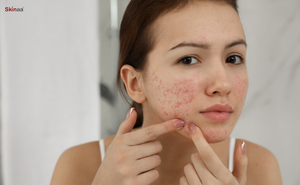In today's fast-paced world, maintaining healthy, hydrated skin can be quite a challenge. Factors like air conditioning, harsh cleansers, and extreme weather can wreak havoc on your skin, leaving it dehydrated and dry. But fear not! We will explore what hydrated skin is, what causes dehydration, and provide you with 10 expert tips to keep your skin looking and feeling its best.
What Is Hydrated Skin?
Before we dive into the tips, let's understand what hydrated skin actually means. An optimal level of moisture characterizes hydrated skin, resulting in a soft, supple, and youthful appearance. It's the key to combating various skin issues and maintaining a flawless complexion.
What Causes Dehydrated Skin?
Dehydrated skin occurs when your skin loses more moisture than it takes in. Several factors contribute to this condition:
1.Air Conditioning
Spending extended periods in air-conditioned environments can strip your skin of moisture, making it prone to dehydration.
2. Aggressive Cleansers
Using harsh cleansers can strip your skin of its natural oils, disrupting its moisture barrier. Opt for gentle, hydrating cleansers to avoid this issue.
3. Over Exfoliation
Exfoliating is crucial for removing dead skin cells, but over-exfoliation can damage your skin's protective layer. This can lead to increased water loss and dehydration.
4. Extreme Temperatures
Extreme cold or hot weather can sap your skin's moisture. Cold air can be harsh, causing your skin to lose hydration rapidly.
Dehydrated Skin Vs. Dry Skin
Dehydrated skin is often confused with dry skin, but they are distinct conditions. Understanding the differences can help you address your skin's specific needs.
Symptoms of Dehydrated Skin
- Dull complexion
- Increased sensitivity
- Fine lines and wrinkles
- Tightness or discomfort
Symptoms of Dry Skin
- Rough texture
- Flakiness
- Itching or redness
- Peeling
Hydration vs. Moisturization
Hydration and moisturization are often used interchangeably, but they serve different purposes in skincare.
- Hydration refers to adding water to your skin cells, ensuring they remain plump and healthy.
- Moisturization, on the other hand, involves sealing in existing moisture to prevent its loss.
How to Hydrate Your Skin: 10 Steps
Ensuring your skin stays hydrated requires a combination of good habits and the right products. Here are ten expert tips to achieve and maintain hydrated skin:
1. Moisturize
A good moisturizer is your skin's best friend. Choose one that suits your skin type and apply it daily to lock in moisture.
2. Exfoliate Regularly
Gentle exfoliation removes dead skin cells, allowing your skin to absorb moisture better. Don't overdo it, though; once or twice a week is sufficient.
3. Reduce Intake Of Caffeine
Caffeine can dehydrate your body, which can reflect on your skin. Limit your caffeine intake to maintain skin hydration.
4. Eat Foods Rich In Water
Include fruits and vegetables with high water content in your diet. Cucumbers, watermelon, and oranges are excellent choices.
5. A Sunscreen Is A Must
Protect your skin from the sun's harmful rays, which can lead to dehydration. Always apply sunscreen when heading outdoors.
6. Use A Humidifier
In dry indoor environments, a humidifier can add moisture to the air, helping your skin retain its hydration.
7. Pamper Yourself With Face Masks/Sheets
Treat your skin to hydrating face masks or sheet masks regularly. They provide an intense moisture boost.
8. Avoid Very Hot And Long Showers
Hot showers can strip your skin of essential oils. Opt for lukewarm water and limit your shower time.
9. Use Hydrating Skincare Products
Look for ingredients like Panthenol, Ceramides, Urea, Glycerin, and Hyaluronic Acid in your skincare products. These ingredients help lock in moisture.
10. Drink An Adequate Amount Of Water
Last but not least, drink plenty of water. Hydrating your body from within is key to maintaining hydrated skin.
Which Is the Best Moisturizer for You?

The best moisturizer for your skin depends on your specific needs and skin type. Consult with a dermatologist to find the perfect fit for you.
When Should You Visit A Dermatologist?
If you've tried various hydration methods and still struggle with dehydrated skin, it's advisable to consult a dermatologist. They can provide personalized recommendations and treatments tailored to your specific skin concerns.
Conclusion
Achieving and maintaining hydrated skin involves a combination of lifestyle choices and effective skincare. By following these expert tips and tailoring them to your unique needs, you can enjoy healthy, radiant, and well-hydrated skin.
Remember, the road to beautiful, hydrated skin begins with a commitment to a proper skincare routine. Embrace these tips, and your skin will thank you with a vibrant, youthful glow.
For personalized skincare advice, visit a dermatologist.
FAQs
Q:How can I tell if my skin is dehydrated or just dry?
A: Dehydrated skin often feels tight and lacks radiance, while dry skin tends to be flaky and rough.
Q:Is drinking water the only way to hydrate my skin from within?
A:While water is essential, you can also boost hydration by consuming foods rich in water content.
Q:Can I use multiple hydrating skincare products together?
A:Yes, layering hydrating products can be beneficial, but consult a skincare expert for guidance.
Q:How often should I apply sunscreen to maintain skin hydration?
A:Apply sunscreen daily, especially when exposed to sunlight.
Q:Are natural remedies effective for skin hydration?
A:Some natural remedies can be helpful, but they should complement a proper skincare routine, not replace it.
Q: Are all moisturizers suitable for every skin type?
A: No, different skin types require different moisturizers. Consult a dermatologist to find the right one for your skin.
Q: Is it possible to over-moisturize my skin?
A: Yes, over-moisturizing can clog pores and lead to breakouts. Use an appropriate amount of moisturizer for your skin type.
Q: Can I use all the mentioned hydrating ingredients together in my skincare routine?
A: It's best to consult a dermatologist or skincare expert to create a personalized routine that suits your skin's specific needs.









